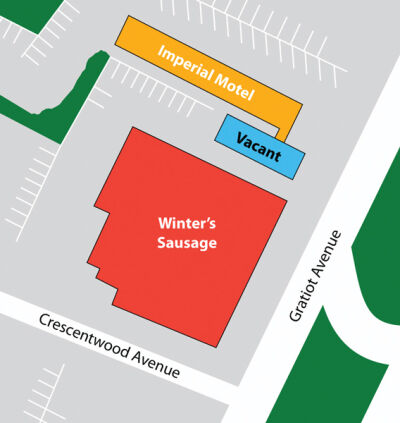EASTPOINTE — An architect representing a local company seeking to expand said the company would withdraw its request for rezoning to allow for the exploration of alternative solutions.
In August 2024, the Eastpointe City Council voted unanimously to establish an industrial district/plant rehabilitation district for Winter’s Sausage after the company gave notice of its plan to expand the facility in a two-phase project.
Currently, Winter’s Sausage is classified as MU-3 Regional Mixed Use. In a request filed Feb. 21 of this year, the company is asking to be rezoned as LI Light Industrial. Changing the zoning would allow the company to “increase and expand upon the current food processing business,” according to a memo filed as part of the request.
The business currently owns four parcels of property on the northwest corner of Gratiot and Crescentwood avenues.
At the Planning Commission’s May 1 meeting, Lee Stevens, an architect with Port Huron-based Stevens Architects, representing Winter’s Sausage, explained a request filed by the company to rezone the current facility to allow for more expansion.
According to Stevens, the company recently purchased a small piece of property to the north, which it wants to connect to the current facility. The building that was acquired previously housed Creative Seasons Apparel.
However, to be able to make the connection, the zoning of that property would need to be changed, he said.
“We’d like to get that zoned so we can expand that way, and that’s where we would be able to expand our business,” he said.
The zoning change approved in 2024 was to allow the facility to expand farther to the west, but with the purchase of the property to the north, those plans have been changed, Stevens said.
Stevens added that the expansion would allow the company to stay in Eastpointe while having space for larger machinery that would allow it to create a better product.
“What happens with machinery is it takes a lot more space, and you get a better product because it’s handled uniformly,” he said. “So, by having that property, allowing us to build over there allows us to use more machinery and have a better facility and a better product.”
Stevens said staying in Eastpointe allows the company to remain more regional.
“We are a regional distributor, so we are close to our primary distributor, which is Lipari, and we’re also close to Eastern Market and all that by being on Gratiot. … So, we like the regional idea, we like the city here, we like what you’ve done with us, always, in the past,” he said.
However, at the start of the meeting, Paul Urbiel, senior principal planner with McKenna, recommended that the commission deny the request.
His biggest concern, he said, was what might happen to the parcels if Winter’s Sausage were to sell one or relocate.
“In the short term it would allow Winter Sausage to remain in operation exactly how it is, but the rezoning is permanent, so if they sold off a parcel or moved somewhere else, that parcel would remain zoned as-is without a hearing like this,” he said.
Additionally, Urbiel said changing the zoning would make the property incompatible with the adopted future-land-use map and master plan.
John D’Hondt, the chair of the Planning Commission, said he was concerned that if the commission approved the request, it could “open a can of worms” in the future for other businesses looking to do the same.
D’Hondt also was concerned about the proximity of the facility to a residentially zoned area, which was echoed by Urbiel. The building recently acquired by Winter’s Sausage shares a wall with the Imperial Motel.
“Part of the concern about utilizing the building that shares a common wall with residential use to the north is that residential use exists and industrial uses that share the wall have the potential to impact it,” Urbiel said.
Stevens added that Winter Sausage wasn’t necessarily looking to rezone the property; it was looking to be able to use it with the current business, he said.
In the end, Stevens said the company would withdraw the request to explore alternative solutions that would allow the company to expand without altering the zoning classification.
 Publication select ▼
Publication select ▼



























